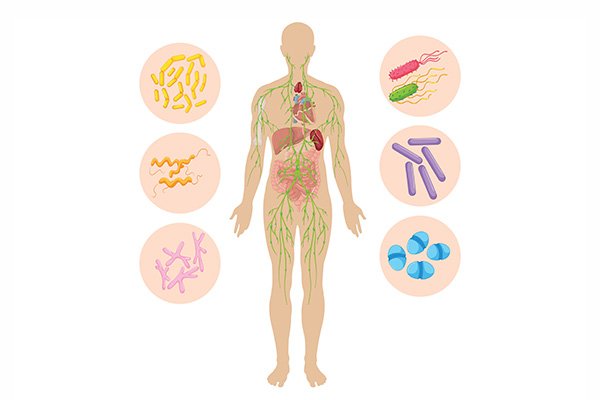The immune system is the human body’s shield against diseases and diseases causing organisms. However, you might not have been informed on the fact that this particular shield can be made even more potent. From this piece, you will discover How To Naturally Boost Your Immune System using diet, exercise, stress management and the use of herbs. You will get to know how the immune system works and how to strengthen immune-related behaviors in day-to-day life.
Being a nutrition guide from healthy recipes to the demystification of popular myths, this article arm you with the tools to take control of your health. Looking to strengthen your bodies immune system? It is time to open the curtain and let’s be a great part of immune health with full of life.
Overview of the Immune System
Immunity is a network of organs, cells, and even proteins having the functions of defending your body against pathogens. This strong and elaborate ego psychological defense mechanism is paramount for general wellness, and health, disease prevention, and well-being. Now let us go and explore some of the most common functions and components of this intricate system.

The Body’s Natural Defense
An immune system is a security system that constantly patrols in search for possible threats. Its primary purpose is a different one, namely, an aggressive one that aims at the removal of undesirable elements, including bacteria, viruses, parasites as well as cancerous cells. According to Better Health Channel, this elaborate system tracks the defeat of every virus meaning that any threat can be identified and averted in the shortest time possible.
Key Components
The immune system consists of several important components:
- White blood cells: These are the leading soldiers of your immune system; these move in the body to survey the field, and destroy the enemy.
- Antibodies: These proteins assist in targeting substances that cause harm in the cell for destruction.
- Lymphatic system: functions such as the sensory fibers and or glands that are sensitive to fluid levels as well as the bacteria.
- Organs: Among the organs which are known to have an immunological function include the pancreas, the bone marrow, and the thymus.
Types of Immunity
Cleveland Clinic explains that there are two main types of immunity:
- Innate immunity: Innate immunity therefore is a natural defense that each and every human being is born with and which offers a broad protection against any unpleasant germs and other substances.
- Acquired immunity: Therefore, acquired immunity is not from birth time. This builds up over time because the body deploys defense mechanisms against all sorts of diseases as one is exposed to different pathogens.
How To Naturally Boost Your Immune System
Natural Health and the Immune System
Eating can influence our body depending on the foods that we take and the most important aspect of the immune system is the wholesome health. It is also vital to mention that a proper diet, exercise, and strength against stress also work as a key to strengthen the immune system. Therefore, if you incorporate anti- microbial habits in your life, you can be sure your body will be strong enough to single out threats that may come.
However, the main key to staying out of these diseases is a healthy immune system that will enable you to go through the flu season without being a casualty. In the subsequent sections, you will read more on natural means that you can increase your immune system as well as improve your body’s defense mechanism against diseases.
The Importance of Diet for Your Immune System
Your Immune system is your body’s defense mechanism against all sorts of pathogen burdens and a lot depends on what foods you take. A balanced diet, which is comprising all essential nutrients, can give a support to the immune system so that it can work efficiently and enable you to avoid different diseases.
Nutrients That Power Your Immune System
Several nutrients are essential to the growth and function of immune cells as interceding ones According to Harvard’s School of Public Health. These include:
- Vitamin C: Natural occurring compounds such as flavonoids are present in different foods including citrus fruits, berries and vegetables like spinach and kale.
- Vitamin D: Found in fatty fish, food that are enriched with it and eggs
- Zinc: Rich in nuts and legumes and shellfish
- Protein: Considered indispensable for the construction of defense body components, and their repair.
Incorporation of these nutrients in the diet can assist in boosting up the immune system of the body naturally. For instance, vitamin C increases the production of antibodies apart from enhancing the production and functionality of white blood cells; zinc is important in the wound healing process and in the body’s ability to fight off infections.

The Gut-Immune Connection
Interestingly, gut health is very much associated with the body’s immune system, as it can affect your immunity. Studies also show that consumption of probiotic and prebiotic foods is good for the tummy and they may help strengthen the immune system. It was established that the regular intake of such foods as fermented foods (yogurt, kefir, sauerkraut) prevent abnormal functioning of gut microbiota.
Balancing Macronutrients and Micronutrients
Although, and it can be seen that some nutrients are important than others, there must be provision for the portion of the macronutrient and micronutrient. The Health and Wellness Center of the Colorado State University further says that macronutrients offer energy base on which immune cells run on while micronutrients work more like antioxidants, antibody producers, and immune system regulators.
A well-rounded diet should include:
- An assortment of different bright colored fruits and vegetables.
- Whole grains
- Lean proteins
It is as good as making consumption of healthy fats, especially those from avocados and nuts, part of a standard diet.
The Role of Natural Health in Immune Support
It is widely documented that incorporating natural health measures such as a healthy diet strongly determine the immune system. This, however, does not mean that because one is on supplement, a healthy balanced meal should be neglected. Based on this, Mayo Clinic Health System suggests that most people can get all the immune building nutrients through balanced diets.
In conclusion, it is imperative to note that the food that you take has a direct relation to your immune system and therefore you should take a healthy diet which you should include a variety of foods in your daily diet systematically. Including many nutrient-rich foods into your diet means providing your body with a means by which to fend off infections and stay healthy in general.
Exercise and Your Immune System
Physical exercise is an important part of people’s lives and has many positive effects which have more to do with health than just body contouring. As far as the immune system is concerned the role of the exercise cannot be overemphasized since this is an important tool used to strengthen the body’s defense against diseases.

The Science Behind Exercise and Immunity
Different studies have also found that one can boost his or her immune system through moderate exercise. As reported by MedlinePlus, exercise helps eliminate bacterium from the lungs and the bronchi, thus lowering your vulnerability to common colds and other illnesses such as flu. Thirdly, exercise impacts antibody and white blood cell which will enable your body to detect diseases earlier on.
Among the interesting effects, exercise has on the human body, the influence it has on the body temperature is quite especially amazing. It may sound counterintuitive, but it would seem that the short burst of heat increase during and after the exercise plays a role in your body’s defense against infections in a way that is analogous to a fever. Such natural highs can become a valuable friend in your fight to keep your health in perfect state.
Finding the Right Balance
However, exercise is also good; one should not run it down as it should be taken in moderation. A study in the National Library of Medicine affirms the ‘J-curve’ by pointing out that moderate exercise training keeps away from the upper respiratory tract infections more than other forms of training. That still being said, intense workout sessions or prolonged training can negatively affect immunity for a short while.
To get the best out of your immunity try to maintain moderate exercise frequency and intensity. This could include:
- Brisk walking
- Cycling
- Swimming
- Light jogging
Ideally, moderate exercise should be done for 150 minutes per week and it is recommended to be distributed in several days of the week.
Long-Term Benefits for Your Immune System
By engaging in a consistent regimen, you can greatly improve your body’s immune system. It has been shown in studies that those who are active have lower levels of inflammatory markers than those who are sedentary.
Moreover, regular exercise enhances the regulation of your immune system and can even postpone the occurrence of immunosenescence – the natural decline in immune function as we age. Therefore, when you include physical activity into your daily routine, you’re not only strengthening your immune system for today but also investing in your future health and well-being.
Exercise is an essential part of achieving natural health and immunity. For a full-scale strategy to raise immunity naturally, pair it with good diet, stress controlling techniques and enough hours of sleep.
How Stress Impacts Your Immune System
Highly intertwined are the stress reaction systems of your body that are responsible for keeping the immune system in place until such a time when it would lose its functionality, thus staving off diseases. Knowing about the bond can help you do something before hand to support your natural health and increase the strength of your immunity.
The Stress-Immune Connection
The release of several hormones happens in the body in times of stress, for example cortisol. Although short-term stress may enhance immune responses in your body, prolonged or long-standing stress can be detrimental to it. Immune responses may be suppressed or regulated poorly with chronic exposure to stress hormones hence you become more vulnerable to diseases and infections.
Studies have indicated that natural killer cells and lymphocytes helpful in combating viruses as well as all other pathogens are reduced due to constant anxiety; there is an inverse relationship between chronic stress levels and such cells within your body. Besides, body anti-inflammatory response can be inhibited by persistently elevated levels of cortisol thus leading to serious infections that take long dates before they heal.

Inflammation and Chronic Diseases
It is known that your immune system can be compromised by stress, but it can also activate an inflammation response. During the course of a life, our body has this type of defense reaction in the short term; but if it persists over time due to chronic anxiety, stress may harm several areas including autoimmunity, heart conditions and even cancer.
Strategies for Stress Management and Immune Support
To keep your immune system working properly, it is important that you include stress management techniques as part of your daily activities.
Some of the effective methods include:
- Mindfulness and meditation should be practiced
- Regular exercises should be done
- A balanced diet containing immune-boosting nutrients must remain in place
- Quality sleep should take precedence
- Strong social ties should be promoted
Studies indicate that activities such as singing, listening to music or spending time outdoors help reduce cortisol levels in our body which subsequently relieves stress. Therefore through these practices one helps their body’s natural defense systems while enhancing general wellbeing.
Always remember that managing stress isn’t just about feeling better in our minds – but it’s an essential tool for ensuring a healthy robust immune system over extended periods of time.
Herbal Supplements for Immunity
In the quest to boost your immune system naturally, herbal supplements have gained significant attention. These natural remedies, derived from plants, have been used for centuries in traditional medicine practices worldwide. Let’s explore some popular herbal supplements that may support your immune health.

Elderberry: Nature’s Antiviral Powerhouse
An extremely well-known support that has come to our attention is the elderberry which has become very helpful when common infections attack. The dark purple colored fruit comes with high amounts of antioxidants making it useful when maintaining immune system functions. According to researches done by various scientists, it has been shown that taking elderberries could shorten the period of flu-like symptoms and lessen their intensity too. But remember this; raw elderberries must always be cooked prior eating because they produce poisons if you eat them fresh.
Echinacea: The Immune Enhancer
Echinacea is a plant that has been associated with enhancing immunity for ages and it comes from North America. There are various opinions on research concerning its effectiveness; some research checks with echinacea stimulate immunity and reduce chances for acquiring flu. Nonetheless, it needs more researches in order to comprehend how it totally affects immunity.
Garlic: More Than Just Flavor
Apart from being a basic ingredient in most dishes, this strong-smelling vegetable is a significant supporter of immune system. A combination of antioxidants found in garlic may improve the action of the immune cells and ease the symptoms of colds and flu. For extra immunity support consider adding garlic to your meals or use garlic supplements; this is more essential during flu season or when it is just about to begin because you need it most at that moment.
Medicinal Mushrooms: Fungi for Immunity
Mushroom varieties like cordyceps and turkey tail seem to be promising as enhancers of immune response. These fungi have elements which can actually encourage the production and functioning of white blood cells. Although this area requires much more research, increasing the intake of medicinal mushrooms could be advantageous to the whole immune system.
Herbal supplements can always enhance immunity even though they should never replace a balanced diet, physical exercise on regular basis or proper stress management. It is advisable to first consult with a doctor before starting any new supplement regime since some herbs might interact with medicines or might not suit otherwise fit individuals. Therefore using these natural strategies helps one build up his/her resilience and wellbeing generally.
Healthy Immune-Boosting Recipes
Fueling your body with the right nutrients is a cornerstone of maintaining a robust immune system. Let’s explore some delicious recipes that not only tantalize your taste buds but also provide a natural boost to your body’s defenses.

Colorful Immunity Smoothie Bowl
Make your day vibrant with a smoothie bowl packed with immune-supporting ingredients. The best part of it? Just blend together some frozen berries, spinach and banana into a plant-based milk of your choice. Put on top chia seeds, sliced almonds and drizzle with honey for extra nutrients. Therefore kick start your natural health program using this breakfast power house; it has high levels of vitamin C, anti-oxidants and fiber.
EatingWell says that recipes supporting a healthy immune system must contain at least 2 or more key nutrients including proteins, vitamins A&C&E as well as Zinc – they must be at least 20% in proportion to reach an efficient level. This smoothie bowl is not left out as it meets all the necessary requirements.
Turmeric-Ginger Immunity Soup
Golden soup is a winner when it comes to warm and inviting foods that can help your immune system fight back the harshest weather conditions. In coconut oil, sauté onions, garlic and ginger before adding turmeric, along with vegetable broth then carrots or sweet potatoes if you choose to have them. Cook until tender and purée till creamy. The turmeric and ginger work together to get rid of inflammation in the body thus promoting its general wellbeing.
According to Everyday Health, immune systems may be significantly improved through the utilization of these important ingredients like turmeric and ginger by this recipe as it is never wrong to eat a good warming comfort food any time you feel like during the year.
Superfood Salad with Citrus Dressing
For lunch that is nutritious, it is worth tasting this superfood salad. Take some slices of avocado and mix them all together with roasted chickpeas, quinoa, kale and spinach. Pour citrus dressing made from olive oil as well as fresh orange juice and honey over it. This salad not only is high in vitamins and minerals; it also has the right ratio protein to carbs and healthy fats to keep your immune system going throughout the day.
This recipe guide provided by BBC Good Food highlights various recipes that help build immunity through being immune-friendly which means they should mainly involve vegetables or plants for their nutrients. This salad serves as a perfect example of what this means, since it brings together so many options for highly-nutritional meals contained within one serving.
It is important to note that an appropriate diet is only one of the strategies for enhancing the immune system. Stress management tools and regular exercise should be part of a broad strategy to improve the body’s natural defenses along with these recipes.
FAQ About Boosting Your Immune System Naturally
Can I really “boost” my immune system?
Boosting the defense against a body’s ability to fight diseases is not an idea that is accurate in terms of science though attractive. As per Harvard Health, there exists no direct tie between how one lives and the performance of his or her immune system. Rather than trying to boost your immunity, which would be ineffective in improving its functioning; it’s better to learn how you can support your immune system through healthy living. To achieve this objective one should avoid smoking, indulge themselves with more fruits and vegetables from their selection while exercising consistently, getting enough sleep alongside remaining stress-free. These habits promote overall wellness thereby facilitating good functionality of the immune system.
Do immune-boosting supplements work?
Despite marketing claims, most supplements and herbal preparations claiming to boost immunity haven’t been proven to significantly improve protection against infection and disease. A balanced diet usually provides all the nutrients your immune system needs. However, zinc supplements may help reduce the severity and duration of respiratory infections when taken at the onset. Always consult with a healthcare professional before starting any supplement regimen.
How does exercise affect the immune system?
Regular moderate exercise can contribute to a healthy immune system by promoting overall good health. It has anti-inflammatory effects and helps regulate the immune system. However, excessive exercise can temporarily suppress immune function. Aim for at least 150 minutes of moderate-intensity aerobic activity or 75 minutes of vigorous-intensity aerobic activity per week for optimal health benefits.
Does stress impact immunity?
Indeed, chronic pressure may deplete the immune system and amplify chances for falling sick. There are several ways to manage stress such as meditation, deep breathing or yoga that can help keep individuals’ immune system healthy. Therefore, keeping stress in check is a priority for one’s general health as well as the ability of his/her body to defend itself from diseases.
Can diet really make a difference in immune health?
Absolutely. Consuming a varied diet with an emphasis on fruits, vegetables, light proteins and unrefined carbohydrates is highly advantageous for the immune system’s necessary micronutrients. It is important to have about 5-9 servings of fruit and vegetables each day so as to procure valuable immune supporting vitamins, minerals and antioxidants. Specific foods that are rich in vitamin C, vitamin D, zinc and probiotics improves the body’s defense.
Bear in mind, these natural approaches will aid you achieve balanced immunity which is vital for general wellbeing as well as avoiding ailments.
Conclusion
By implementing these natural immune-boosting strategies, you’re taking control of your health and giving your body the tools it needs to defend against illness. Remember, a strong immune system isn’t built overnight – it’s the result of consistent, healthy habits. Start small by incorporating one or two of these tips into your daily routine, then gradually add more as you become comfortable. Your immune system is your body’s frontline defense, so treat it with care. With patience and dedication, you’ll be on your way to a more resilient, healthier you. Stay committed to your wellness journey, and your immune system will thank you for years to come.




Pingback: Excedrin Migraine: Fast And Effective Relief For Headache Pain - Health Wander
Pingback: Chronic Stress: How It Damages Your Health And Powerful Ways To Fight Back - Health Wander